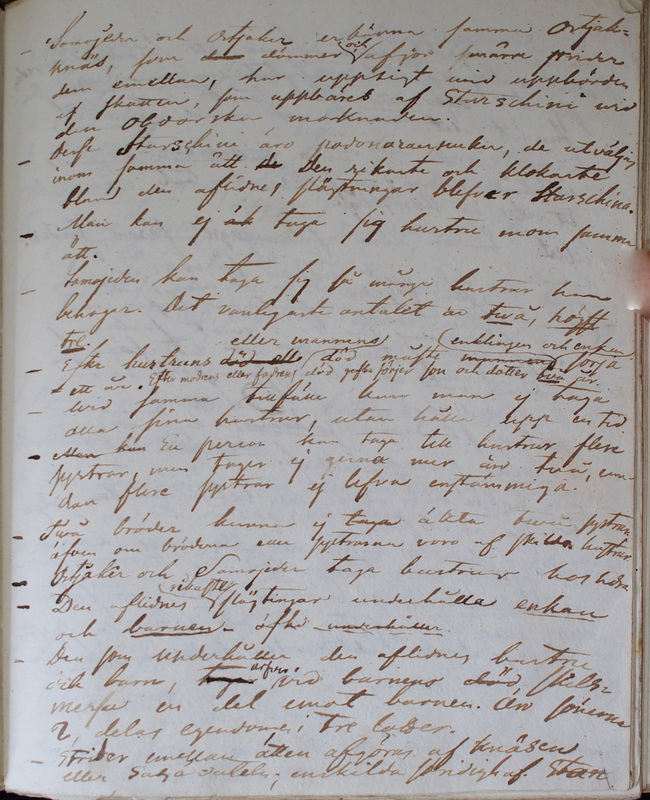Ethnographiska, historiska och statistiska anmärkningar. 252
Title
Description
| Samojeder och Ostjaker erkänna samma Ostjak=knäs,
som dömmer och afgör smärre striderSee [ostjak-knäs].
dem emellan, har uppsigt wid uppbörden af skatten, som uppbäres af Starschini wid den Obdorska marknaden. |
The Samoyeds and Ostyaks recognise the same Ostyak Prince, who acts as a judge and decides minor disputes among them and supervises the collection of the tax, which is collected by the leaders during the Obdorsk market. |
| Desse starschini äro родоначалники, de utväljes inom samma ätt. Den rikaste och klokaste bland dem aflidnes slägtningar blifver starschina.
See [starschina] and [knjaz].
|
These leaders are clan leaders; they are selected from within the clan. The richest and wisest of the deceased’s family becomes the leader. |
|
Man kan ej taga
sig hustru inom sammaNenets marriage follows exogamic principles, according to which certain families belong to the same group, which is why their members cannot marry each other. Castrén translated the TN еркар SW ‘ätt’, which translates as family; Russian researchers use the term fratrija, whereas the historical documents use the term plemja ‘tribe’, and the TN тэнз. In the mid-19th century, the Charjuči and Vanjuita clearly represented two separate exogamic groups. In addition, the Forest Nenets were considered to represent a community of their own. Still, it is known that, for example, the Nenets living in the European Arctic might marry each other, although they belonged to the Vanjujta community. Accordingly, the marriage contracts were made between different families, TN еркар. It is unclear exactly which social groups Castrén is referring to here. (Dolgich 1970: 53–64; Verbov 1939)
ätt. |
One cannot take a wife from within the same family. |
|
Samojeden kan taga
sig så många hustrur hanPolygamy has often attracted the interest of travellers and researchers and is often described as a patriarchal practice lacking any rules, as Castrén does here. However, Chomič has noted that polygamy might have represented a solution to childlessness and a decrease in work resources in the family as a result of illness or age. Although the practice might cause tensions, it also requires the husband to solve the practicalities in such a way that each wife receives proper space and attention. The oldest of the wives has a special position in the family; she is called пюды, in contrast to таты, the term for the rest of the wives. (Chomič 1966: 156–158, 176–177)
behagar. Det vanligaste antalet är twå, högst tre. Efter hustruns eller mannens död måste enklingen och enkan sörja ett år. Efter moderns eller faderns död sörjer son och dotter två år. |
A Samoyed man can take as many wives as he pleases. The most common number is two, the highest three. After the death of the wife or husband, the widow or widower must mourn for one year. After the death of the mother or father, the son and daughter mourn for two years. |
| Wid samma tillfälle kan man ej taga alla sina hustrur, utan hålla upp en tid. |
One cannot take all one’s wives on the same occasion, but has to wait for a while. |
| Man kan En person kan taga till hustrur flere systrar, men tager ej gerna mer än två, eme- dan flere systrar ej lefva enstämmiga. |
One man can take several sisters as his wives, but it is not preferred to take more than two, because many sisters do not live in harmony. |
| Twå bröder kunna ej taga äkta twå systrar äfven om bröderna eller systrarna voro af skilda hustrar. Ostjaker och Samojeder taga hustrur hos hdra[hvarandra] |
Two brothers cannot take two sisters as their wives even if the brothers or sisters were born of different wives. The Ostyaks and Samoyeds take wives from each other. |
| Den aflidnes rikaste slägtningar underhålla enkan och barnen - underhåller. |
The richest relatives of the deceased maintain the widow and the children. |
| Den som underhåller den aflidnes hustru och barn, tagar arfver vid barnens död skils- messa en del emot barnen. Ärv sönerna 2, delas egendomen i tre lotter. |
The one who takes care of the widow and children of the deceased inherits one part if the child divorces. If two sons inherit, the property is divided into three lots. |
| Strider emellan ätten afgöras af knäsen eller <säljavtalens> enskilda stridigh[eter]. af sta[te]n. |
Disputes between clans are decided by the Prince <or some individual sale disputes> by the State. |
[[the page is upside down]]

